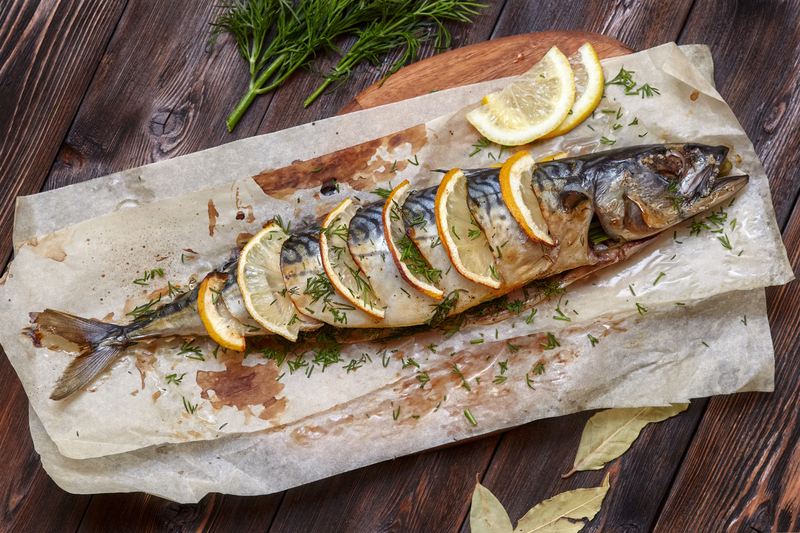 When it comes to preparing delicious and healthy meals, fish is often at the top of the list for many people.
When it comes to preparing delicious and healthy meals, fish is often at the top of the list for many people.
Baking fish is a popular cooking method as it retains the natural flavors and moisture of the fish while minimizing the need for added fats or oils.
However, the choice of cookware can have a significant impact on the final outcome.
One common debate among home cooks is whether it’s better to bake fish in glass or metal.
In this article, we’ll explore the advantages and disadvantages of both options to help you make an informed decision for your next fish dish.
The Case for Baking Fish in Glass

- Even Heat Distribution
One of the key benefits of using glass cookware for baking fish is its ability to distribute heat evenly.
Glass dishes and bakeware have the advantage of retaining heat and slowly releasing it over time.
This ensures that the fish cooks uniformly and reduces the risk of overcooking or unevenly cooked portions.
- Transparency
Glass dishes offer the unique advantage of being transparent.
This means you can easily monitor the cooking progress of your fish without having to open the oven door, which can cause heat loss.
Keeping an eye on your fish allows you to pull it out of the oven at the perfect moment when it’s moist and flaky.
- Non-reactive
Glass is non-reactive, which means it won’t interact with the acidity or flavors of the fish or any seasonings you use.
This ensures that your fish maintains its natural taste without any metallic or off-flavors that can sometimes occur with metal cookware.
- Easy Cleanup
Cleaning up after baking fish in glass is relatively simple.
Glass dishes are typically dishwasher-safe, and any baked-on residue can be easily soaked and scrubbed off.
This makes glass a convenient choice for those looking to minimize post-cooking cleanup.
This Pyrex deep baking dish offers greater depth than traditional casserole dishes, enhancing its capacity for culinary creations.
Its user-friendly design includes built-in side handles for easy transport and a secure BPA-Free plastic lid to prevent spills during transit.
Crafted from durable tempered glass, it resists stains and food odors, and it’s safe for the dishwasher, freezer, microwave, and oven.
The non-toxic BPA-Free plastic lid is also freezer, microwave, and top-rack dishwasher safe, making reheating and storing meals hassle-free.
The Case for Baking Fish in Metal

- Faster Cooking Times
Metal baking pans and sheets tend to heat up more quickly than glass, resulting in faster cooking times.
This can be an advantage when you’re in a hurry or want to achieve a crispy texture on the outside of your fish.
- Better Browning
If you enjoy a golden-brown crust on your fish, metal cookware is often the way to go.
The quick and efficient heat transfer in metal pans allows for better browning and crisping, which can add a delightful texture and flavor to your dish.
- Durability
Metal baking pans and sheets are generally more durable and less prone to breakage compared to glass dishes.
They can withstand higher temperatures without the risk of shattering, making them suitable for broiling and other high-heat cooking methods.
- Versatility
Metal cookware is versatile and can be used for a wide range of cooking tasks beyond baking, such as roasting, grilling, and sautéing.
If you’re looking for multipurpose cookware, metal pans are a valuable addition to your kitchen.
This baking pan made from aluminiized steel is equipped with Americoat, a feature that facilitates the swift release of baked goods, making cleanup a breeze.
Simply wash them with hot water, mild soap, and a gentle scrub brush or sponge.
The nonstick Americoat coating, a patented silicone coating that is PTFE, PFOA, and BPA-free, ensures easy release of all baked goods while minimizing the effort required for cleaning.
Proudly made in the USA.
Bottom Line – Is It Better to Bake Fish in Glass or Metal?
 Ultimately, the choice between baking fish in glass or metal comes down to your personal preferences and cooking goals.
Ultimately, the choice between baking fish in glass or metal comes down to your personal preferences and cooking goals.
Glass offers even heat distribution, transparency, and non-reactivity, making it an excellent choice for those who prioritize a gentle, even cooking process and want to keep a close eye on their food.
On the other hand, metal provides faster cooking times, better browning, durability, and versatility, catering to those who desire efficiency and versatility in their cookware.
Consider the specific recipe, your desired cooking outcome, and the advantages of each material when making your decision.
In some cases, you may even choose to use both glass and metal for different aspects of your fish dish.
Regardless of your choice, with a little practice and experimentation, you can achieve delicious and perfectly baked fish that suits your taste and culinary style.




